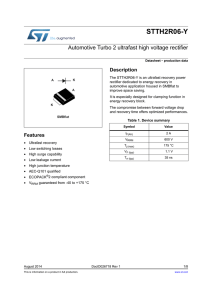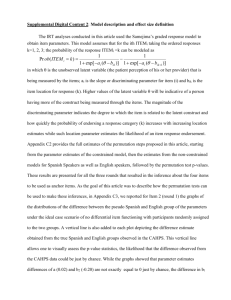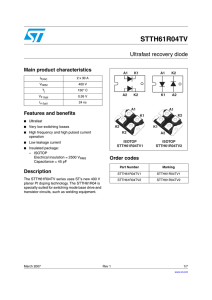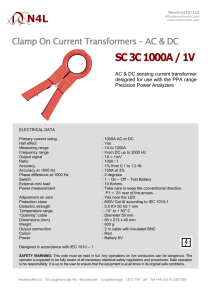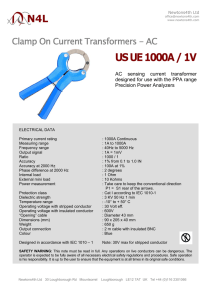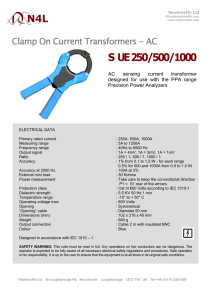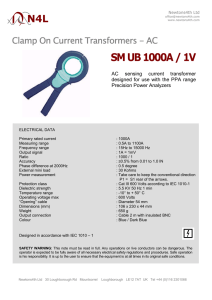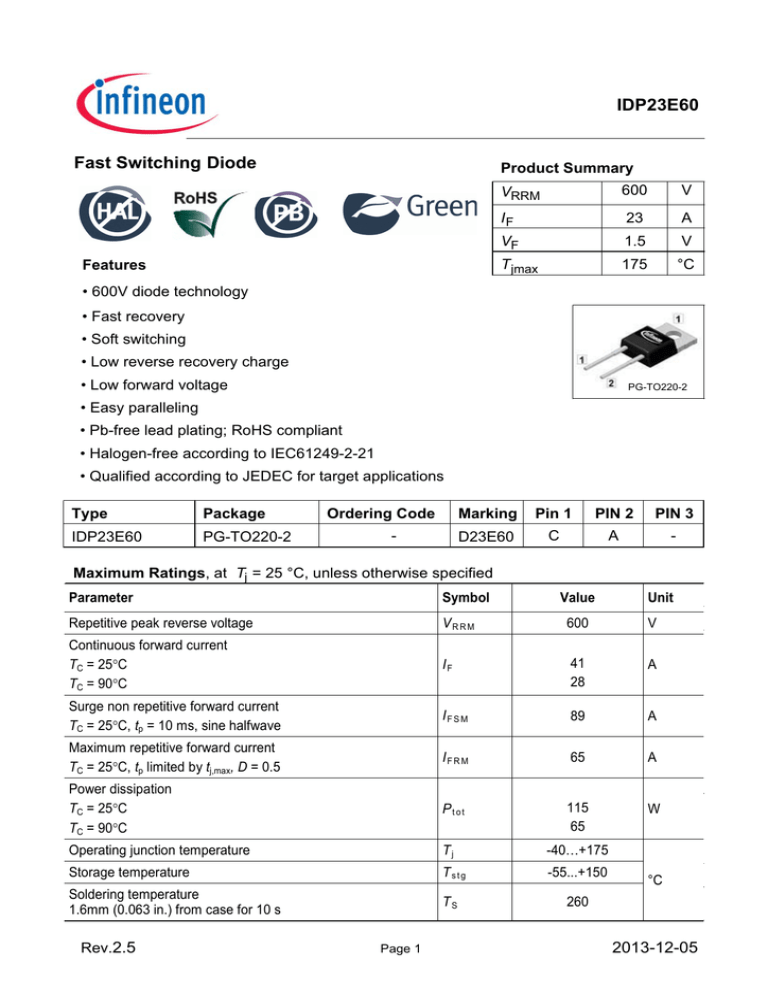
IDP23E60
Fast Switching Diode
Product Summary
Features
VRRM
600
V
IF
23
A
VF
1.5
V
T jmax
175
°C
• 600V diode technology
• Fast recovery
• Soft switching
• Low reverse recovery charge
• Low forward voltage
PG-TO220-2
• Easy paralleling
• Pb-free lead plating; RoHS compliant
• Halogen-free according to IEC61249-2-21
• Qualified according to JEDEC for target applications
Type
Package
IDP23E60
PG-TO220-2
Ordering Code
-
Marking
Pin 1
PIN 2
PIN 3
D23E60
C
A
-
Maximum Ratings, at Tj = 25 °C, unless otherwise specified
Parameter
Parameter
Symbol
Symbol
Repetitive
peak
reverse
voltage
Repetitive
peak
reverse
voltage
Continousforward
forward
current
Continuous
current
VRRM
VRRM
IF
600
600
VV
A
IF
4141
2828
A
Surge non repetitive forward current
Surge non repetitive forward current
TC = 25C, tp = 10 ms, sine halfwave
I FSM
IFSM
8989
A
Maximum repetitive forward current
Maximum repetitive forward current
TC = 25C, tp limited by tj,max, D = 0.5
IFRM
I FRM
6565
A
TC=25°C, tp limited by Tjmax, D=0.5
Power
dissipation
Power
TC = 25Cdissipation
TTCC==25°C
90C
PtotP t o t
115
65
115
WW
TTCC==25°C
25C
TTC ==90°C
90C
C
Value
Value
Unit
Unit
TC=25°C, tp=10 ms, sine halfwave
Operating
TC=90°C junction temperature
Storage
temperature
Operating
and storage temperature
Soldering
temperature
Soldering
temperature
1.6mm
(0.063
from (0.063
case forin.)10from
s case for 10s
wavesoldering,in.)
1.6mm
Rev.2.5
Tj
tg
Tj , T
Tsstg
TS T
S
Page 1
-40…+175
65
-55...+150
-55...
+175
260
260
°C°C
°C
2013­12­05
IDP23E60
Thermal Characteristics
Symbol
Parameter
Values
Unit
min.
typ.
max.
-
-
1.3
-
-
75
-
-
50
Characteristics
Thermal resistance, junction - case
RthJC
SMD version, device on PCB:
RthJA
@ min. footprint
@ 6 cm 2 cooling area
1)
K/W
Electrical Characteristics, at Tj = 25 °C, unless otherwise specified
Parameter
Symbol
Values
min.
typ.
Unit
max.
Static Characteristics
IR
Reverse leakage current
μA
V R=600V, Tj=25°C
-
-
50
V R=600V, Tj=150°C
-
-
1900
VF
Forward voltage drop
V
IF=23A, T j=25°C
-
1.5
2
IF=23A, T j=150°C
-
1.5
-
1Device on 40mm*40mm*1.5mm epoxy PCB FR4 with 6cm² (one layer, 70 μm thick) copper area for drain
connection. PCB is vertical without blown air.
Rev.2.5
Page 2
2013­12­05
IDP23E60
Electrical Characteristics, at Tj = 25 °C, unless otherwise specified
Symbol
Parameter
Values
min.
typ.
Unit
max.
Dynamic Characteristics
t rr
Reverse recovery time
ns
V R=400V, IF=23A, diF/dt=1000A/μs, Tj=25°C
-
120
-
V R=400V, IF=23A, diF/dt=1000A/μs, Tj=125°C
-
164
-
V R=400V, IF=23A, diF/dt=1000A/μs, Tj=150°C
-
170
-
I rrm
Peak reverse current
A
V R=400V, IF = 23A, diF/dt=1000A/μs, Tj =25°C
-
17
-
V R=400V, IF =23A, diF/dt=1000A/μs, T j=125°C
-
19.5
-
V R=400V, IF =23A, diF/dt=1000A/μs, T j=150°C
-
21.5
-
Q rr
Reverse recovery charge
nC
V R=400V, IF=23A, diF/dt=1000A/μs, Tj=25°C
-
970
-
V R=400V, IF =23A, diF/dt=1000A/μs, T j=125°C
-
1580
-
V R=400V, IF =23A, diF/dt=1000A/μs, T j=150°C
-
1770
-
V R=400V, IF=23A, diF/dt=1000A/μs, Tj=25°C
-
4.4
-
V R=400V, IF=23A, diF/dt=1000A/μs, Tj=125°C
-
4.8
-
V R=400V, IF=23A, diF/dt=1000A/μs, Tj=150°C
-
5
-
S
Reverse recovery softness factor
Rev.2.5
Page 3
2013­12­05
IDP23E60
1 Power dissipation
2 Diode forward current
Ptot = f (TC)
IF = f(TC)
parameter: Tj ≤ 175 °C
parameter: Tj≤ 175°C
45
120
A
W
35
30
IF
P tot
90
75
25
60
20
45
15
30
10
15
0
25
5
50
75
100
125
0
25
175
°C
50
75
100
125
TC
175
°C
TC
3 Typ. diode forward current
4 Typ. diode forward voltage
IF = f (VF)
VF = f (Tj)
2
70
V
46A
A
1.8
1.7
VF
IF
50
-55°C
25°C
100°C
150°C
40
1.6
23A
1.5
30
1.4
1.3
20
11,5A
1.2
10
1.1
0
0
0.5
1
1.5
1
-60
2.5
V
VF
Rev.2.5
Page 4
-20
20
60
100
160
°C
Tj
2013­12­05
IDP23E60
5 Typ. reverse recovery time
6 Typ. reverse recovery charge
trr = f (diF/dt)
Qrr =f(diF/dt)
parameter: V R = 400V, T j = 125°C
parameter: VR = 400V, Tj = 125 °C
2100
500
46A
nC
ns
1900
1800
46A
23A
11.5A
350
1700
Qrr
trr
400
23A
1600
1500
300
1400
1300
250
1200
200
11.5A
1100
1000
150
900
100
200
300
400
500
600
700
800
800
200
A/μs 1000
di F/dt
300
400
500
600
700
800
A/μs 1000
diF/dt
7 Typ. reverse recovery current
8 Typ. reverse recovery softness factor
Irr = f (diF/dt)
S = f(diF /dt)
parameter: V R = 400V, T j = 125°C
parameter: VR = 400V, Tj = 125°C
24
13
A
20
10
S
18
Irr
11
46A
23A
11.5A
16
14
8
12
7
10
6
8
5
6
4
4
200
Rev.2.5
300
400
500
600
700
800
3
200
A/μs 1000
di F/dt
Page 5
46A
23A
11.5A
9
300
400
500
600
700
800
A/μs 1000
diF/dt
2013­12­05
IDP23E60
9 Max. transient thermal impedance
ZthJC = f (tp)
parameter : D = t p/T
10 1
IDP23E60
K/W
ZthJC
10 0
10 -1
D = 0.50
10 -2
0.20
0.10
0.05
single pulse
0.02
10 -3
0.01
10 -4 -7
10
10
-6
10
-5
10
-4
10
-3
10
-2
s
10
0
tp
Rev.2.5
Page 6
2013­12­05
IDP23E60
Outline drawing: TO220-2
Rev.2.5
Page 7
2013­12­05
IDP23E60
Published by
Infineon Technologies AG
81726 Munich, Germany
81726 München, Germany
© 2009 Infineon Technologies AG
All Rights Reserved.
Legal Disclaimer
The information given in this document shall in no event be regarded as a guarantee of conditions or characteristics.
With respect to any examples or hints given herein, any typical values stated herein and/or any information regarding
the application of the device, Infineon Technologies hereby disclaims any and all warranties and liabilities of any kind,
including without limitation, warranties of non-infringement of intellectual property rights of any third party.
Information
For further information on technology, delivery terms and conditions and prices, please contact the nearest Infineon
Technologies Office (www.infineon.com).
Warnings
Due to technical requirements, components may contain dangerous substances. For information on the types in
question, please contact the nearest Infineon Technologies Office. Infineon Technologies components may be used in
life-support devices or systems only with the express written approval of Infineon Technologies, if a failure of such
components can reasonably be expected to cause the failure of that life-support device or system or to affect the safety
or effectiveness of that device or system. Life support devices or systems are intended to be implanted in the human
body or to support and/or maintain and sustain and/or protect human life. If they fail, it is reasonable to assume that the
health of the user or other persons may be endangered.
Rev.2.5
Page 8
2013­12­05

